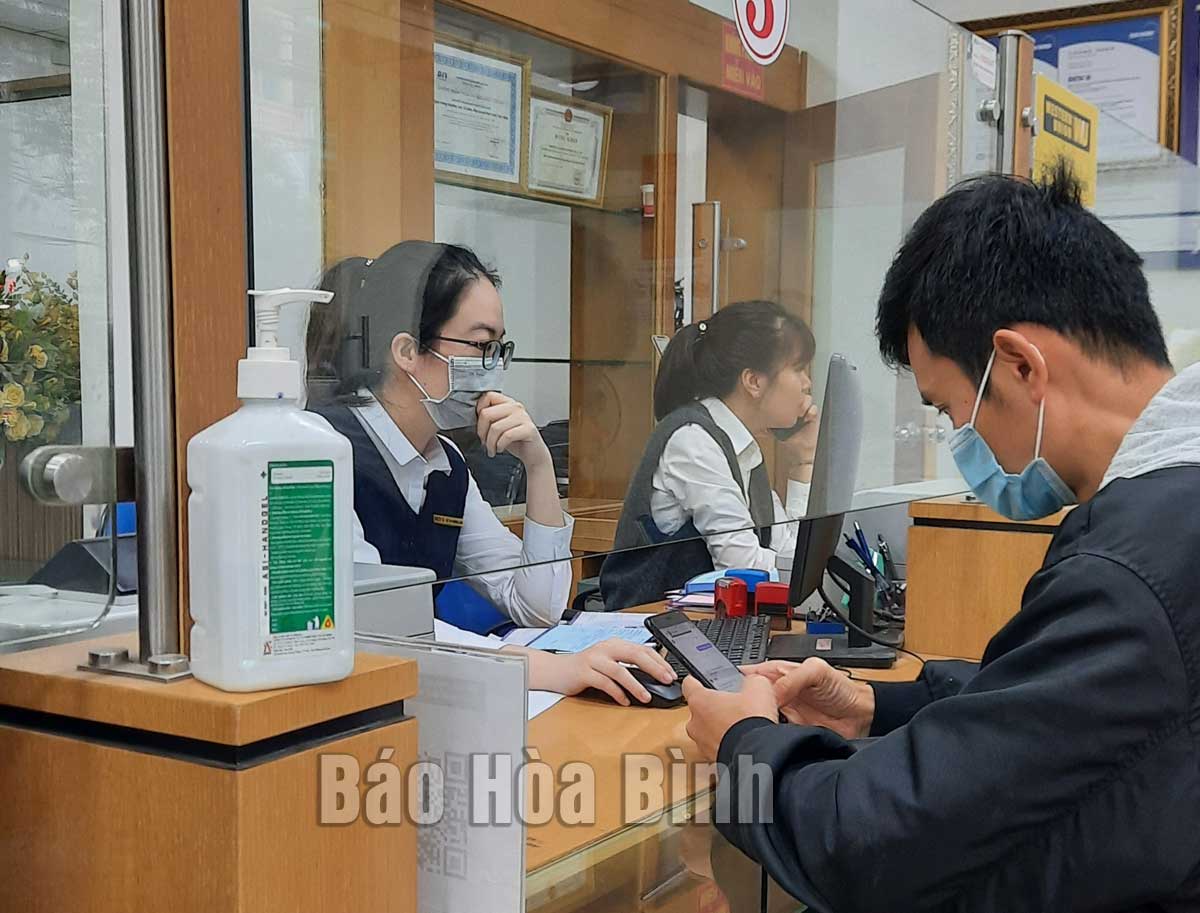
(HBO) - Digital transformation has gradually become an irreversible trend, opening up unprecedented development opportunities as well as challenges and requirements for self-adjustment to seize these opportunities for each country, each economy, each organisation and each individual.

Commercial banks actively apply information technology in
transactions.
Digital transformation is the total and
comprehensive change in the methods of operation and organisation of an agency,
unit, collective or an apparatus. In order to successfully conduct digital
transformation, at first, it is necessary to change the thinking and
perceptions of heads of Party Committees and administrations at all levels, as
well as agencies and units. Leaders must be properly aware of the importance of
digital transformation for the development of their localities, agencies and
units; actively participate in this process, take the lead in changing the
leadership thinking, applying digital transformation in directing and
performing daily work. Leaders also need to have confidence that digital
transformation will help solve the existing problems of their organizations and
are consistent with the set goals so as to work with others to successfully
implement digital transformation in the most scientific and feasible manner.
In order to seize trends and opportunities
brought by the fourth industrial revolution, on December 24, 2021, the Standing
Board of the Hoa Binh Provincial Party Committee issued Resolution No. 08-NQ/TU
on the province’s digital transformation in the 2021 – 2025 period, with a
vision to 2030.
The resolution emphasizes the important role of
digital transformation and sets out specific goals of basically completing the
goals of building e-administration; speeding up the smart urban development
process; achieving basic criteria on digital transformation in a number of
important fields on all three pillars of digital government, digital economy,
digital society; and basically completing digital transformation in Party
agencies and socio-political organisations of the province by 2025.
The digital economy will account for 20 percent
of the province’s GRDP by 2025, and over 30 percent by 2030, according to the
resolution. The province will focus on implementing digital transformation
steps on three pillars of digital government, digital economy and digital
society and eight prioritised fields of healthcare, education, finance -
banking, agriculture, transportation and logistics, energy, natural resources
and environment, industrial production./.
In the spirit of "Party members go first, the people follow”, all households of Party members in the Doan Ket sub-region in Da Bac town, Da Bac district, voluntarily removed gates and fences, and donated land when the road expansion project passed through their properties. Inspired by their example, 68 households in the sub-region quickly followed suit, contributing over 1,400 sq.m of residential and perennial cropland to widen the main road through the residential area. The exemplary role of Party members in Doan Ket stands as a shining example of studying and following President Ho Chi Minh’s thought, morality, and lifestyle.
The Hoa Binh provincial People's Committee held a monthly meeting on May 29 to assess the implementation of socio-economic development tasks in the first six months of 2025, the progress of key projects, and some other important issues.
During his lifetime, President Ho Chi Minh always expressed his deep affection and special concern for children and youth. He once emphasized: "Caring for and educating children well is the responsibility of the entire Party and the entire people”; "First of all, the family (i.e. grandparents, parents, siblings) must do this job well”. "the Party Committees…, the Children’s Committee, the Youth Union, the education sector, and all related organizations must have specific plans to ensure children grow healthier and more progressive”. His teachings has been remaining valuable and serving as the guiding principles in the work of protecting, caring for, and educating children. In line with this ideology, Hoa Binh Province has continuously been prioritizing and investing resources in the well-being of children in recent years.
Mr. Nguyen Phi Long, the alternate Member of the Party Central Committee and Secretary of the Provincial Party Committee chaired the meeting of the Standing Committee of the Provincial Party Committee to provide opinions on several investment projects within the province. There was the attendance of Ms. Bui Thi Minh, the Permanent Deputy Secretary of the Provincial Party Committee and Chairwoman of the Provincial People’s Council; Mr. Bui Đuc Hinh, the Deputy Secretary of the Provincial Party Committee and Chairman of the Provincial People’s Committee and other members of the Standing Committee; the leaders from other departments, agencies, and some localities.
The Standing Board of the Vietnam Fatherland Front (VFF) Committee of Hoa Binh province held a meeting on May 28 to honour outstanding village elders, village heads, and reputable individuals from local ethnic minority and religious communities.
In mid-May, the provincial Museum organised an exhibition named "Duoi la co Dang Cong san Viet Nam quang vinh” (Under the flag of the glorious Communist Party of Vietnam). This meaningful activity took place in the joyful atmosphere to celebrate the country's major holidays and the Party congresses at all levels for the 2025-2030 term, towards the 14th National Party Congress.



